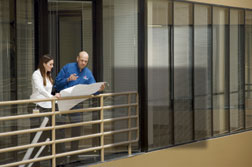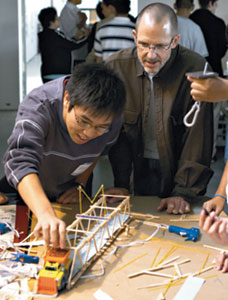 Washington Group International Mentoring efforts started early are helping assure industry sustainability.
|
It used to be that long-time employees and those just starting or planning their careers did not connect. But a tightening labor market and fears of losing institutional memory and competitive advantage to escalating retirements are pushing generations closer through organized mentoring.
“The war for talent is upon all companies in our industry,” says Andrew Snodgrass, vice president of information technology for Boise-based Washington Group International. “The next generation emerging from college provides new ideas, talents and the base of resources that are critical to sustaining growth in the business.”
Three years ago, Snodgrass became an executive sponsor for Boise State University through WGI’s College Connections program, which sends senior-level employees back to their alma maters or to nearby colleges to form partnerships with academic institutions and their valuable human resources. He leads a team of WGI professionals building links to the university that generate more bonding opportunities between students and employees at all levels, from project managers to corporate executives. A Boise State alumnus, Snodgrass visits the campus several times a year to meet with key leaders and professors, serve as a guest lecturer and present to student chapters of professional associations.
“We need to bring in the next generation at a faster pace than the retirees are leaving,” Snodgrass says. “Establishing a presence at key universities and meeting students early allows us to assist with their development. This allows us to ‘interview’ students over time to assess their true potential.”
As a result, the number of Boise State interns as well as new hires at the company have increased, says Rebecca Mirsky, chair of the school’s construction management department. There are currently 120 Boise State graduates on the employee rolls.
Resident Experts
Universities find that mentoring is a more critical component for student success. Industry employees provide needed time, talent and financial support to faculty and students, and further enrich the educational experience by serving on student thesis boards, college advisory committees and as resident experts on resume writing and interviewing.
Texas A&M University, College Station and its Dwight Look College of Engineering, which recently joined College Connections, has made a commitment to create more strategic partnerships. “Active corporate participation with our students is a critical part of their preparation for careers,” says Matt Jennings, Texas A&M Foundation development director. “By showing them how classroom education translates to success in the real world, they become much more prepared once they graduate.”
Companies also are reaching down to the high school level through organizations such as ACE Mentor Program. It began in 1994 after 17 firms joined forces and adopted about 90 students from local high schools. There now are local chapters in more than 80 cities across the U.S., enabling about 30,000 economically challenged high school students to work on mock projects provided by architect, engineer and construction manager mentors.
 Ace Mentor Program Programs such as ACE Mentor offer high school students a learning experience outside the class.
|
Getting a Taste
Justin Matteson and Nubia Castano originally wanted careers as architects. Their interest was piqued after hearing about the ACE Mentor Program at their respective high schools. “I thought the program would be a great way to explore different job options, find out more about what was involved in each profession and see if architecture really was for me,” says 20-year-old Matteson, who joined while a senior at George Washington Community School in Indianapolis. “As a result, I decided to pursue a career in construction management because I wanted to do more field work outdoors.”
Matteson says he got to know professionals at Turner Construction Co., which led to internship opportunities in his first two years of college. He is completing a degree in construction engineering management technology at Indiana University Purdue University-Indianapolis.
Castano, 26, had a similar experience. Joining ACE opened a career path into construction management and a new job as an assistant project manager for Hudson Meridian Construction Group, New York City. “The program helped me make the right decision. I realized I enjoyed the building aspect more than the designing,” she says. “It is important to develop a network no matter how young you are. After attending...
 Related Links:
Related Links: 
Post a comment to this article
Report Abusive Comment